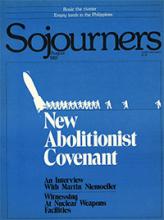Two summers ago, a meeting was called in Washington, D.C., for those interested in organizing a protest of the Air Force Association's annual weapons exposition to be held at the Sheraton Washington Hotel that September. Two of us showed up. It was a small beginning.
This September, hundreds of people from the Washington area will come to the Sheraton Washington for a week to show their opposition to what has become known as the arms bazaar. It will be the third straight year that local people have gathered to say that the Air Force Association's arrogant display of nuclear weapons will not go on in this town without a voice being raised. The effort to shut down the arms bazaar has become a foundation of a grassroots movement for peace in the Washington, D.C. area. This movement, centered in the churches and actively supported by many local pastors, brought out almost 1,000 people last year. Next month we expect even more for a week of prayer, leafletting, and civil disobedience.
Our experience here in Washington is occurring also in many other places. Though still in the early stages, a discernible public movement against nuclear weapons can now be seen. Certainly it is no longer possible to deny that the dangerous escalation of the nuclear arms race has begun to catalyze the faith of many Christians and has the potential to spark a historic outpouring of Christian conscience.
For several years, each August issue of Sojourners has commemorated the bombings of Hiroshima and Nagasaki by publishing the testimony of someone who has turned against the nuclear arms race because of Christian faith. Two years ago we interviewed Billy Graham on his change of heart on nuclear weapons. Last year, George Zabelka, the chaplain to the crew that dropped the Hiroshima bomb, told why he has devoted his life to peace.
Read the Full Article

